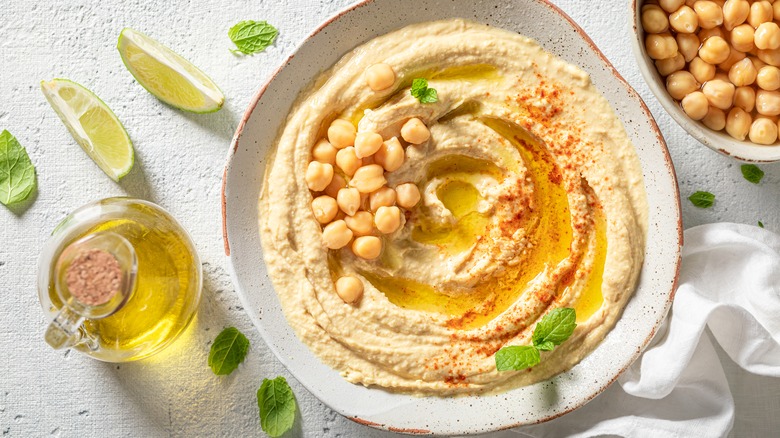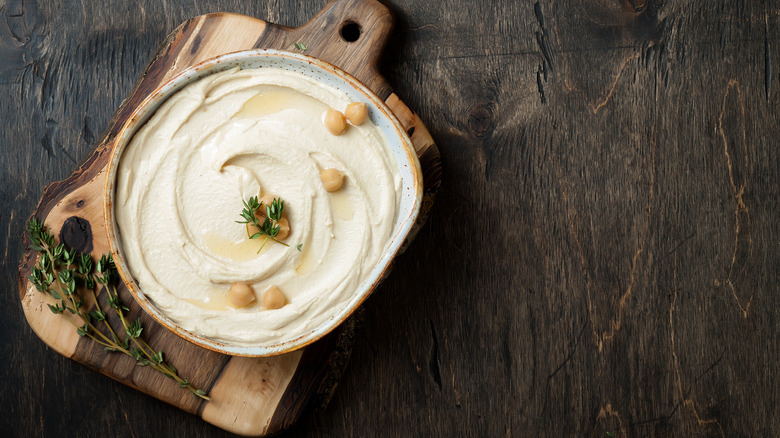How To Properly Freeze Hummus, And How Long It'll Last You
If you go a little overboard buying or making hummus, we can hardly blame you — hummus is delicious. After all, a humble dish of mashed chickpeas doesn't rise to that kind of popularity unless it's really, really good. But the human body does have its limits, and as tasty as hummus may be, one can only eat so much of it. Fortunately, if you end up with too much hummus on your hands, you can freeze it to enjoy later. There are just a couple of things you should keep in mind for best results.
When water freezes, its molecular structure changes. Over time, when left in the freezer, moisture within food will begin to migrate toward the food's surface and sublimate. This causes freezer burn, so protecting your hummus from the dry air of the freezer is crucial. Freezer burn will give hummus an unpleasant, dry, mealy texture, even once defrosted. Proper storage can help mitigate this, but time is no friend – you really shouldn't leave hummus in the freezer for more than four to six months. It won't spoil in the freezer, but after that point, it just won't taste as good and you'll almost certainly have some textural weirdness. Show the classic dish some respect by properly freezing and thawing it, for the most delicious results possible.
The Big Chickpea Chill
As is the case with most frozen leftovers, the best strategy is to freeze small portions — especially since it's recommended to never re-freeze thawed hummus. Small portions are easiest to work with, too, because they freeze and thaw more quickly. If you have a brand new, unopened container of store-bought hummus, you can toss it right into the freezer since it's already airtight. The liquid in hummus can expand as it freezes, so pop it into a freezer bag to stop it from being exposed to air if it does break open. Store-bought hummus will freeze better than homemade because it contains preservatives to, well, preserve its taste and texture.
For homemade hummus, or opened store-bought hummus, you'll want to portion it into personalized serving sizes. Whether that means portioning enough for a single schmear of hummus-topped toast, or into individual containers to thaw and serve as a dip at parties. If you are doing extra-small portions, try using a sheet pan — just like when freezing homemade meatballs – or filling an ice cube tray. Once the portions are solidly frozen you can toss them into a freezer bag and grab one when needed. For those larger portions, you'll need to take extra precautions to keep your hummus fresh and moist. A spray of olive oil or a drizzle over top works wonderfully as a protective barrier — and be sure to leave a little room for the hummus to expand as it freezes.
You're getting warmer
Eating your frozen stash of hummus will require some planning, as it needs to be thawed in the refrigerator, which can take several hours. Your best bet is to put the frozen hummus in the fridge the night before you use it. You can also use your microwave very gently (in one-minute increments at the most) until it's thawed. Or, put the hummus container in warm water to help speed it along.
Once fully thawed, you can use the hummus however you normally would. Since freezing can affect the flavor and texture of the hummus, you may want to doctor it up a bit before serving. You can use the same tricks as you would to make store-bought hummus look restaurant quality. Chop some fresh parsley, drizzle with pesto, or top with an olive tapenade — but definitely mix in olive oil and lemon juice to restore any lost flavor and moisture. Plain hummus has less flavor to lose to the freezer, so it's best to add the extra ingredients after you defrost since that's when they'll be at their most potent.


